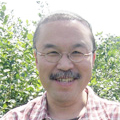Professor Noboru Minakawa

Speciality / Research theme / Keywords
EcologySupervision
Masters ProgrammeQualifications
PhD
Personal/work Web page addresses
- http://www.tm.nagasaki-u.ac.jp/nekken/research/vector_ecology.html
- http://www.tm.nagasaki-u.ac.jp/nekken/english/research/vector_ecology.html
Affiliation(s)
International Centre of Insect Physiology and Ecology, Kenya.
Background
I received my PhD degree from the University of Washington, Seattle, WA, USA. During my graduate school course work, I studied aquatic entomology and stream ecology. I participated in a series of international biological expeditions on the Kuril Islands and Sakhalin Island in Russian Far East between 1994-1998 and 2001-2003. In 1997, I joined the International Centre for Insect Physiology and Ecology in Kenya, and started my career as a medical entomologist. After working on sleeping chironomids from Nigeria at the National Institute of Sericultural and Entomological Science in Japan for six months, I moved to the State University of New York at Buffalo in the US in 2001, and Saga Medical School in Japan in 2004. Since I joined NEKKEN in 2006, I have not moved from Nagasaki. On my holidays, I can be found fly fishing in mountain streams in Japan and Africa.
Teaching
I lecture on medical entomology. In the past, I taught aquatic entomology at the University of Washington.
Research
Since my first visit to Africa, my research has focused on the ecology of African malaria vectors, Anopheles gamibae s.s., Anopheles arabiensis and the Anopeheles funestus group. In the last five years, I have been involved in a field study trial for testing new mosquito nets in western Kenya and Malawi. In South Africa, I work with the Japan Agency for Marine-Earth Science and Technology, South Africa Medical Research Council, South Africa Department of Technology and Science, and Limpopo Department of Health for developing a climate-based early warning system for infectious diseases. I also work on dengue vectors in Africa and Southeast Asia.
The country/countries where you work currently
- Kenya
- Malawi
- South Africa
- Vietnam
- Myanmar
Five MOST IMPORTANT/INTERESTING recent publications
- Fonzi E, Higa Y, Bertuso A, Futami K, Minakawa N. Human-mediated marine dispersal influences the population structure of Aedes aegypti in the Philippine Archipelago. PLOS Neglected Tropical Diseases. 2015; 9(6):e0003829.
- Futami K, Dida GO, Sonye GO, Lutiali PA, Mwania MS, Wagalla S, Lumumba J, Kongere JO, Njenga SM, Minakawa N. Impacts of insecticide treated bed nets on Anopheles gambiae s.l. populations in Mbita District and Suba District, western Kenya. Parasites & Vectors. 2014; 7:63.
- Larson PS, Minakawa N, Dida GO, Njenga SM, Ionides EL, Wilson ML. Insecticide-treated net use before and after mass distribution in a fishing community along Lake Victoria, Kenya: successes and unavoidable pitfalls. Malaria Journal. 2014: 13:466.
- Minakawa N, Dida GO, Sonye GO, Futami K, Njenga SM. Malaria vectors in Lake Victoria and adjacent habitats in western Kenya. PLoS One. 2012; 7(3):e32725.
- Hashizume M, Chaves LF, Minakawa N. Indian Ocean Dipole drives malaria resurgence in East African highlands. Scientific Reports. 2012:2:269.
Message
You must go to the field first, and see the problems. In the field, you will have better understandings of the problems, and the solutions. If you maintain the presumptuous attitude that you have come to help, the local people will stay away from you. Instead, you are more likely to be helped and taught by the local people. I hope that you will develop the ability to think, learn and take action together with local people.
